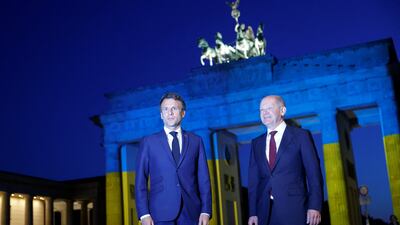French President Emmanuel Macron visited Berlin's symbolically important Brandenburg Gate with German Chancellor Olaf Scholz on Monday as the two leaders met to discuss bilateral ties and the future of the EU.
Mr Macron said he intended to show “full support for Ukraine” as he and Mr Scholz approached around 200 people gathered nearby.
Many in the crowd were draped in Ukraine's blue and yellow national colours and chanted “Mariupol”, the south-eastern Ukrainian city devastated by Russian strikes.
The Brandenburg Gate, which was illuminated in Ukraine's national colours, historically formed a central part of the wall that separated East and West Berlin, symbolising the Cold War's “Iron Curtain” that divided the world into capitalist and communist blocs.
Some Ukrainians in the crowd criticised the French and German governments for being too close with Russia, which invaded its neighbour on February 24.
“I would like to see more courage,” Tania, a 40-year-old doctor who has lived in Germany for 25 years, told AFP.
“I understand [Mr Macron and Mr Scholz's] fear for their own citizens, but we mustn't underestimate Russia,” she said and added that Moscow could attack Poland or the Baltic states next.
“People in the West are scared because of soaring prices and the fear of a third world war.”
Mr Scholz in particular has come under fire for arms deliveries to Ukraine that have been deemed insufficient and Germany's reliance on Russian energy imports.
Meanwhile, Mr Macron on Monday said it would take “decades” for a candidate such as Ukraine to join the EU and suggested building a broader political club beyond the bloc that could also include Britain.
The idea immediately found favour with Mr Scholz, who described it as a “very interesting suggestion” that he was “very pleased” to discuss with the French leader.
Ukraine, which is battling the Russian invasion, is seeking EU membership and the European Commission has said it will respond to the request next month — a key step before the issue is taken up by member states.
But Mr Macron buried any hopes of swift membership for Ukraine, suggesting rather that it may be more efficient to consider building a wider club beyond the EU.
“I am saying this in all honesty — honesty that we owe to the Ukrainians,” Mr Macron said.
“We can have an accelerated process … to accept candidate status for Ukraine but we know that given our standards and the criteria, it would probably take decades for Ukraine to really join the European Union.”
But, noting the urgency of giving Ukraine and other EU hopefuls such as Moldova and Georgia a place in the heart of Europe, he called for the creation of a “European political community”.
Britain, too, could join this club, Mr Macron said.
“The United Kingdom decided to leave our European Union but it can have a place in this political community,” he said.
For countries that have already embarked on the membership route and which are close to joining, Mr Macron said he thought they “should go to the end of this road”.
But he said “others like Bosnia-Herzegovina which are much further or others in the western Balkans”, or those that “have embarked on the joining questions … sometimes from decades ago” may wish to consider joining a wider club instead.
Mr Macron said the bloc, “given its level of integration and ambition”, could not be Europe's only organising body.
“It is our historic obligation … to create what I would describe before you today as a European political community,” he said.
“This new European organisation would allow democratic European nations … to find a new space for political co-operation, security, co-operation in energy, transport, investment, infrastructure, the movement of people.”

















































